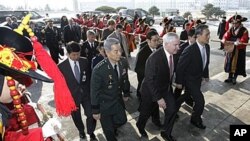Top defense officials of the United States and South Korea held brief talks about North Korea as U.S. Defense Secretary Robert Gates wrapped up his week-long Asia trip.
Gates is the latest figure on the international stage to signal the possibility of peacefully re-engaging North Korea. During a meeting Friday in Seoul with his South Korean counterpart, Gates said any return to multinational talks with Pyongyang could only come after the two Koreas meet.
"When, or if, North Korea’s actions show cause to believe that negotiations can be productive and conducted in good faith, then we could see a return to the six-party talks," he said. "But the DPRK [North Korea] leadership must stop these dangerous provocations and take concrete steps to show that they will begin meeting their international obligations."
South Korean Defense Minister Kim Kwan-jin said there is a fear of additional military provocations by North Korea after a pair of attacks in 2010.
Kim mentions last year’s sinking of a South Korean warship and the shelling of Yeonpyeong island. He says South Korea feels under attack amid the highest tensions on the peninsula since the Korean War, six decades ago.
Gates also met with South Korean President Lee Myung-bak during a short visit to the country as he wrapped up a week-long trip to Asia.
U.S. and South Korean officials say the stop in Seoul was primarily to discuss their common concern about the communist North and to strengthen deterrence in dealing with Pyongyang’s provocations.
The United States’ concerns about North Korea also were apparent when the Chairman of the Joint Chiefs of Staff, Admiral Mike Mullen, spoke in Washington Wednesday.
Mullen used the words "danger" and "dangerous" repeatedly when answering questions about North Korea’s increasing missile capability to strike beyond its shores.
"The potential provocations could become more and more catastrophic. And that's been a principal point of focus as we look at engaging the leadership in China and others to say this is something we really have to figure out a way to deter in the future," he said.
In addition to China, Mullen added, coordinated pressure on impoverished North Korea also needs to come from South Korea, Japan and Russia.
Six-country talks about North Korea’s nuclear development have not been held since 2008. Pyongyang renounced the forum in 2009. North Korea had pledged in 2005 to dismantle its nuclear weapons programs in exchange for international aid and diplomatic benefits.
Since shelling Yeonpyeong, killing four South Koreans, North Korea has taken a more conciliatory tone, asking repeatedly for talks.
South Korea, so far, has rebuffed the request, saying Pyongyang must first show it is sincere about ending provocations and about making progress on giving up its nuclear arms.





